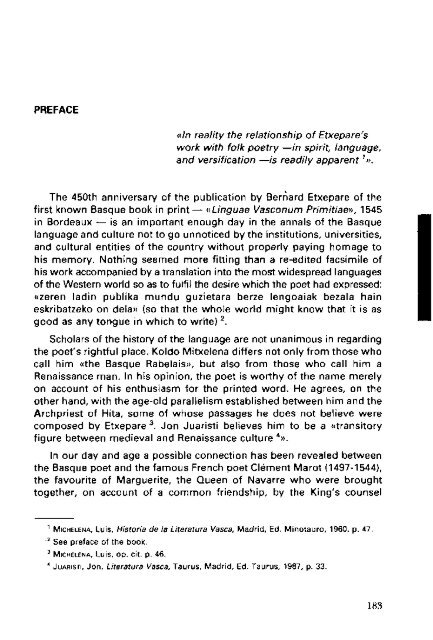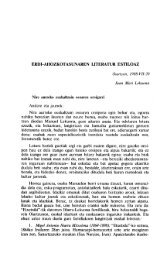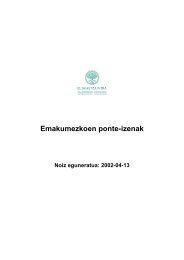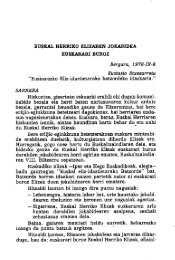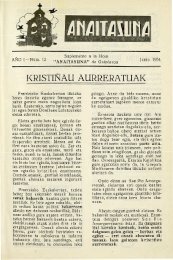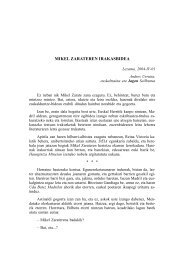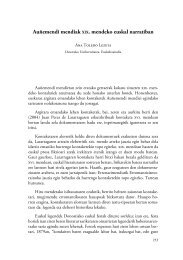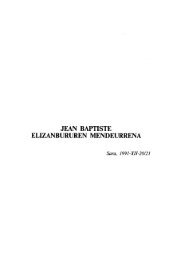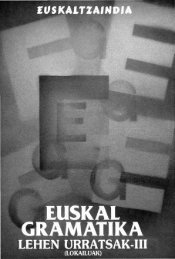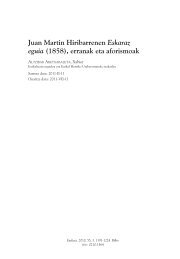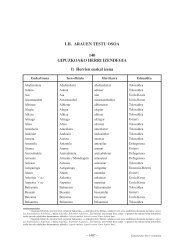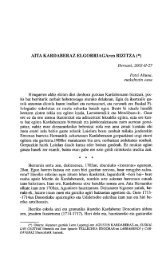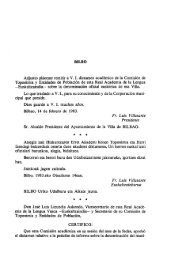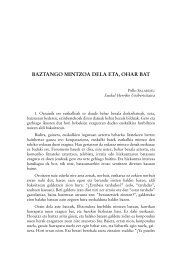- Page 1 and 2:
LINGUAE VASCONUM PRIMITIAE 1545-199
- Page 3 and 4:
LINGUAE VASCONUM PRIMITIAE Bemard E
- Page 5:
LINGUAE VASCONUM PRIMITIAE Euskaldu
- Page 8 and 9:
ko. Ez da, bada, harritzeko Etxepar
- Page 10 and 11:
Ez dirudi, aldiz, gauza bera esan d
- Page 12 and 13:
Liburuak bere baitan dituen hamabos
- Page 15:
22 4I(A
- Page 70 and 71:
Aduertant Impressor, et lectores qu
- Page 72 and 73:
1.- DOKTRINA KRISTIANA 1 Munduian d
- Page 74 and 75:
Orazione igandeko 58 Miserikordiaz
- Page 76 and 77:
salbatzia, damnatzia, erioa eta biz
- Page 78 and 79:
205 Regla ezak egun oroz ansa heure
- Page 80 and 81:
278 juje jauna iraturik egonen da g
- Page 82 and 83:
355 Bai erhoki konplazitu ene kontr
- Page 84 and 85:
429 Begira, othoi, meskabutik ene g
- Page 86 and 87:
36 jeinkoaz landan mundu orok eztu
- Page 88 and 89:
112 O anderia, ezin date ehor zure
- Page 90 and 91:
35 Bertuteak behar luke gizonetan h
- Page 92 and 93:
33 Amoria ezin zenzuz ezin daite go
- Page 94 and 95:
VI.- AMOROSEN PARTITZIA 1 Parti alb
- Page 96 and 97:
VlII.- POTAREN GALDATZIA 1 - «Andr
- Page 98 and 99:
31 - «Hanbat ere handi tuzu, ezin
- Page 100 and 101:
35 - «Horlako eranzutez utzi nazaz
- Page 102 and 103:
XlI.- AMORE GOGORRAREN DESPITA 1 An
- Page 104 and 105:
XlII.- MOSEN BERNAT ETXAPARERE KANT
- Page 106 and 107:
72 Berzen gaztigari inzan, orai adi
- Page 108 and 109:
30 Oraidano egon bahiz inprimitu ba
- Page 110:
ERREGISTROEN IABURPENA Francois Mor
- Page 113 and 114:
PRESENTACION Han transcurrido ya cu
- Page 115 and 116: destinatario de la obra de Etxepare
- Page 117 and 118: chardt, Ernst Lewy y de modo especi
- Page 119 and 120: época y tal como pocos años antes
- Page 121 and 122: PRIMICIAS DE LA LENGUA VASCA por el
- Page 123 and 124: Al noble y justo abogado del Rey, c
- Page 125 and 126: En el cementerio 29 Al entrar recue
- Page 127 and 128: 97 Los domingos debes examinar con
- Page 129 and 130: 172 No hay pastor que no recoja sus
- Page 131 and 132: 235 Emite a todas partes la orden d
- Page 133 and 134: 312 Y la tierra temblará con conti
- Page 135 and 136: Oración 389 Salve, María, Señora
- Page 137 and 138: 11.- DESENGAÑO DE AMANTES 1 Allá
- Page 139 and 140: 74 Este mundo tiene engañados a mu
- Page 141 and 142: 111.- EN DEFENSA DE LAS MUJERES 1
- Page 143 and 144: IV.- COPLAS DE CASADOS 1 ¡Dios mí
- Page 145 and 146: v.- EL AMANTE SECRETO 1 Una bella y
- Page 147 and 148: VlI.- EL AMANTE CELOSO 1 Es malo, a
- Page 149 and 150: IX.- REQUERIMIENTO DE AMOR 1 -«¡B
- Page 151 and 152: X.- DISPUTA DE ENAMORADOS -«Dejad
- Page 153 and 154: 71 -«No desesperéis, amor mío! V
- Page 155 and 156: 33 -«¿Cómo podré vivir si estoy
- Page 157 and 158: 37 ¡Dios mío! he cometido pecados
- Page 159 and 160: 1 ¡Euskara, sal fuera! XIV.- CONTR
- Page 161 and 162: xv.. SALTAREL 1 Ya que el euskara h
- Page 163 and 164: • Orreaga I Roncesvalles Garazi,
- Page 165: FOREWORD Four and a half centuries
- Page 169 and 170: along with four further editions in
- Page 171 and 172: other hand, the original text just
- Page 173 and 174: THE FIRST FRUITS OF THE BASQUE LANG
- Page 175 and 176: To the righteous and noble King's c
- Page 177 and 178: 196 In the churchyard 29 When enter
- Page 179 and 180: 198 97 On Sundays thou shouldst car
- Page 181 and 182: 200 172 Every shepherd gathers his
- Page 183 and 184: 202 235 He gives the order that fro
- Page 185 and 186: 204 312 And the earth shall quake t
- Page 187 and 188: 206 Prayer 389 Hail, Mary, our Lady
- Page 189 and 190: 208 11. DISAPPOINTMENT BE1WEEN LOVE
- Page 191 and 192: 210 74 This world has many deceived
- Page 193 and 194: 212 111. IN DEFENCE OF WOMEN 1 Do n
- Page 195 and 196: 214 IV. VERSES FOR THE MARRIED 1 Oh
- Page 197 and 198: 216 v. A SECRET LOVE 1 A lovely, ge
- Page 199 and 200: 218 VIT. A JEALOUS LOVER 1 'Tis alw
- Page 201 and 202: 220 IX. A REQUEST FOR LOVE 1 Blesse
- Page 203 and 204: 222 X.LOVERS'QUARREL 1 Let me come
- Page 205 and 206: 224 71 - My beloved, despair not, 1
- Page 207 and 208: 226 33 - If I am at odds with you,
- Page 209 and 210: 228 33 Lord, preserve me from the g
- Page 211 and 212: 230 XIV. CONTRAPAS 1 Basque, go for
- Page 213 and 214: 232 XV. SAUTERELLE 1 Rasque has com
- Page 215 and 216: Donibane Garazi, Nafarroa Behereare
- Page 217 and 218:
AVANT-PROPOS Quatre siecles et demi
- Page 219 and 220:
Récemment, on a mis en évidence l
- Page 221 and 222:
Par dessus tout le travail de reche
- Page 223 and 224:
cinquantaine d'années seulement le
- Page 226 and 227:
XII, 37. HIC OADUCAT dit le texte,
- Page 229 and 230:
Au juste et noble avocat du Roi, co
- Page 231 and 232:
256 Au cimetiére 29 Pense bien aux
- Page 233 and 234:
258 87 Je suis étonné, au sujet d
- Page 235 and 236:
260 164 Pensez, je vous prie, que n
- Page 237 and 238:
262 231 Alerte! Alerte! Le monde en
- Page 239 and 240:
264 307 Les signes précurseurs vie
- Page 241 and 242:
266 385 S'il se trouve en nous une
- Page 243 and 244:
268 11.- CRITIQUE DES AMOUREUX 1 Le
- Page 245 and 246:
270 68 Tant que tu as le temps, fai
- Page 247 and 248:
272 111.- EN FAVEUR DES FEMMES 1 Ne
- Page 249 and 250:
274 IV.- POEME DFS MARIFS 1 Dieu,
- Page 251:
276 V.- CELUI QUI FST AMOUREUX EN S
- Page 255 and 256:
280 IX.- LA REQUETE D'AMOUR 1 Béni
- Page 257 and 258:
282 X.- LES DISPUTES DES AMOUREUX 1
- Page 260 and 261:
XlI.- LE MEPRIS DE LA CRUELLE 1 Mes
- Page 262 and 263:
XIII.- LA CHANSON DE MONSIEUR BERNA
- Page 264 and 265:
68 Tu ne souffres ici de rien, sauf
- Page 266:
31 Si tu es resté jusqu'á présen
- Page 269 and 270:
Donibane Garazi 295
- Page 272 and 273:
EINLEITUNG «ln der Tat, die Verwan
- Page 274 and 275:
Etxepare, gebürtig aus Donibane Ga
- Page 276 and 277:
des Basques eux-mémes», Van Eys,
- Page 278 and 279:
Wie dem auch immer sei, Lafon jeden
- Page 280 and 281:
PRIMIZIEN DER BASKISCHEN SPRACHE vo
- Page 282:
Dem edlen und gereehten Advokaten d
- Page 285 and 286:
316 97 Des Sonntags muBt du genau p
- Page 288 and 289:
205 Halte dein Haus táglich in Ord
- Page 290 and 291:
278 Der Herr Richter wird droben er
- Page 292 and 293:
355 hingegen erfreutet ihr in talle
- Page 294 and 295:
433 Und spáter, wenn der Tod zu mi
- Page 296 and 297:
36 AuBer Gott hat niemand auf der W
- Page 298 and 299:
112 O Herrin! Niemand kann dir áhn
- Page 300 and 301:
35 Die Tugend der Mánner sollte gr
- Page 302 and 303:
33 Die Liebe liíBt nicht durch Ver
- Page 304 and 305:
VI. TRENNUNG DER GEUEBTEN Wenn ich
- Page 306 and 307:
VIII. BITTE UM EINEN KUSS 1 «Cott
- Page 308 and 309:
31 «So groB sind sie, daB ich sie
- Page 310 and 311:
35 «Gib mir nicht solche Antworten
- Page 312 and 313:
XII. VERACHTUNG DER GRAUSAMEN GELIE
- Page 314 and 315:
XIII. DAS LIED VON PFARRER BERNARD
- Page 316 and 317:
72 Du warst doch Berater der andere
- Page 318 and 319:
35 Keine Sprache, nicht die Franzó
- Page 320 and 321:
AUSZUG AUS DEN PARLAMENTSREGISTERN
- Page 322 and 323:
Etxepareren ustezko jaiotetxea (Buz
- Page 324 and 325:
PRESENTAZIONE Sono passati quattro
- Page 326 and 327:
dell'opera di Etxepare e difensore
- Page 328 and 329:
figurano nell'opera etxepariana con
- Page 330 and 331:
all'originale, adducendo come motiv
- Page 332 and 333:
PRIMIZIE DELIA LINGUA BASCA del sig
- Page 334 and 335:
Al nobile e giusto avvocato del Re,
- Page 336 and 337:
372 Al cimitero 29 All'ingresso, ri
- Page 338 and 339:
374 . 97 La domenica devi esaminare
- Page 340 and 341:
376 172 Qualunque pastore raduna le
- Page 342 and 343:
378 235 Emana dovunque I'ordine che
- Page 344 and 345:
380 312 E la terra tremerá con sco
- Page 346 and 347:
Preghiera 389 Salve, Maria, Signora
- Page 348 and 349:
384 11.- CRITICA DEGU AMANTI I A ci
- Page 350 and 351:
386 74 Questo mondo ha imbrogliato
- Page 352 and 353:
388 111.- A FAVORE DELLE DONNE 1 No
- Page 354 and 355:
390 IV.- STROFE DEGU SPOSI 1 Dio mi
- Page 356 and 357:
392 v.- L'AMANTE SEGRETO 1 Una bell
- Page 358 and 359:
394 VlI.- L' AMANTE GELOSO 1 E brut
- Page 360 and 361:
396 IX.- DOMANDA D'AMORE 1 «Benede
- Page 362 and 363:
398 X.- DISPUTA D'INNAMORATI 1 «La
- Page 364 and 365:
400 71 «Non disperatevi, amore mio
- Page 366 and 367:
402 33 «Come potro vivere se sono
- Page 368 and 369:
404 33 Dio mio! Difendimi dal poter
- Page 370 and 371:
406 XIV.- CONTRAPPASSO 1 Euskara, e
- Page 372 and 373:
408 xv.- SALTERELLO 1 L'euskara esc
- Page 374:
Liburu hau 1995.eko abenduaren 3an


